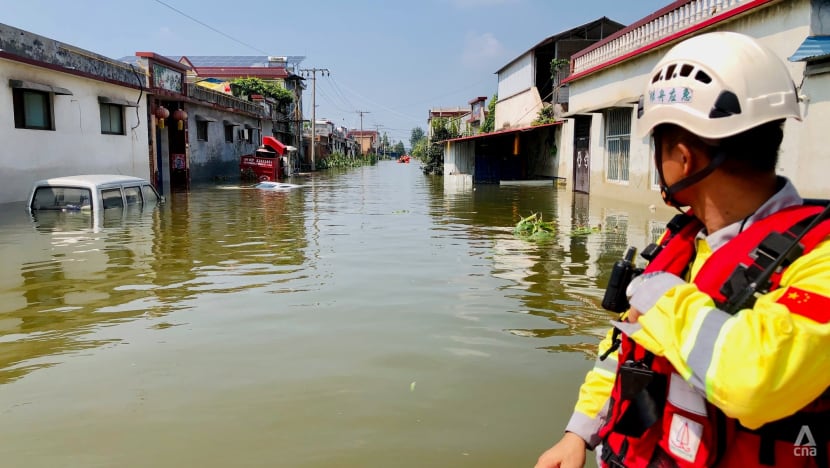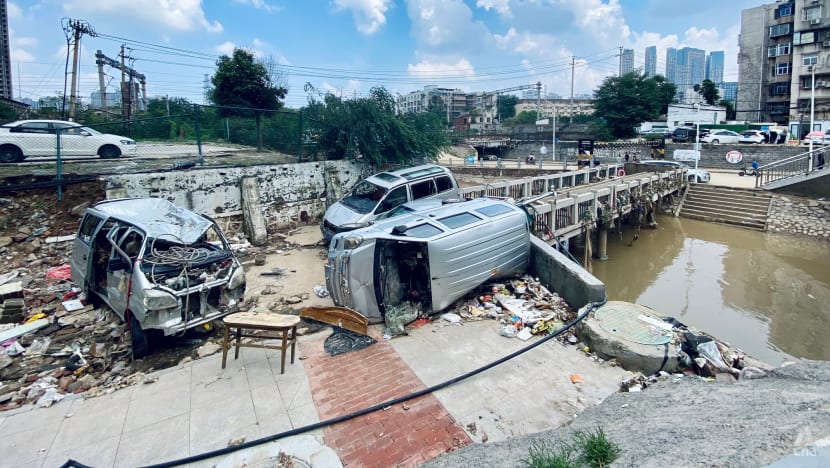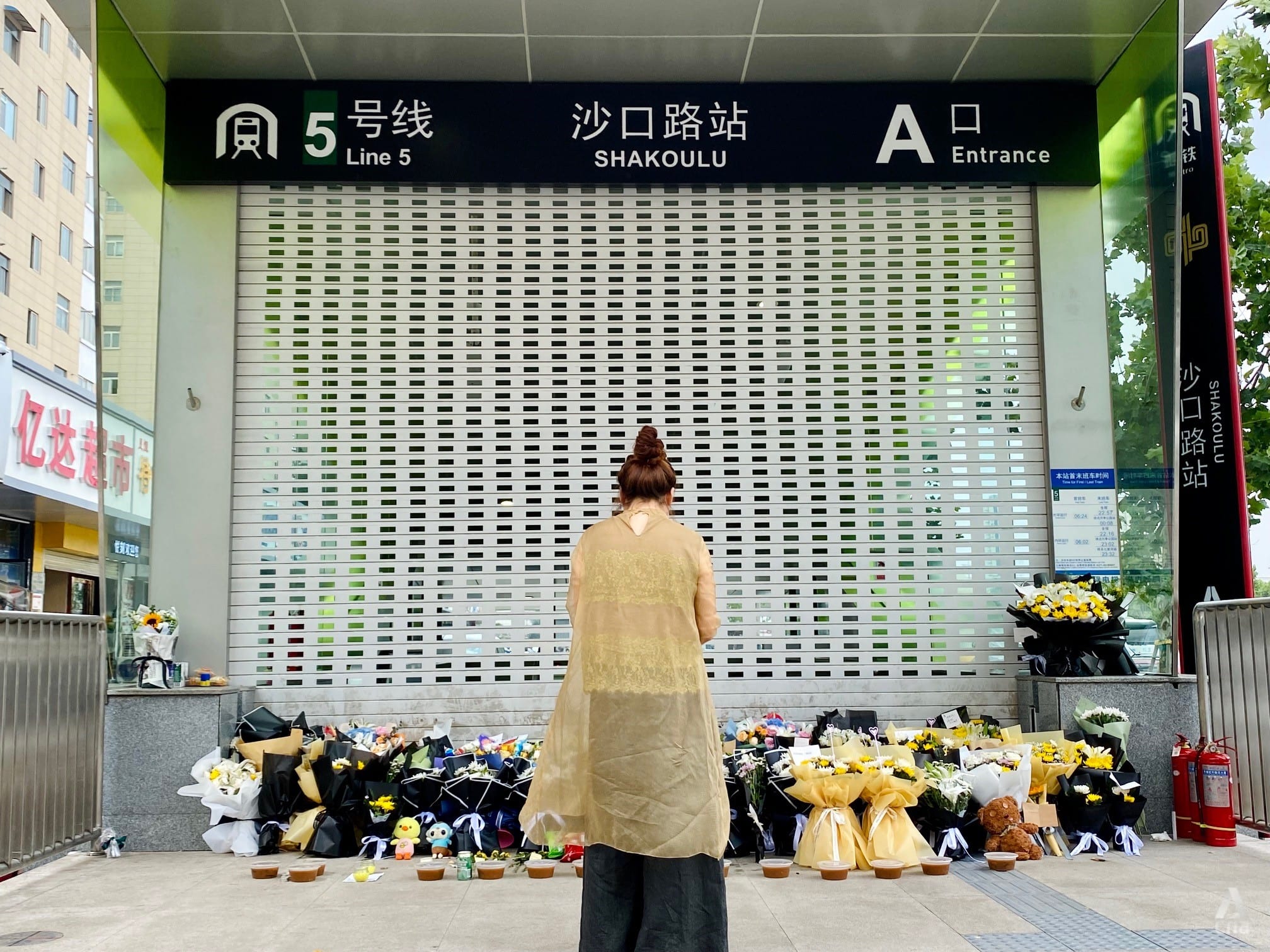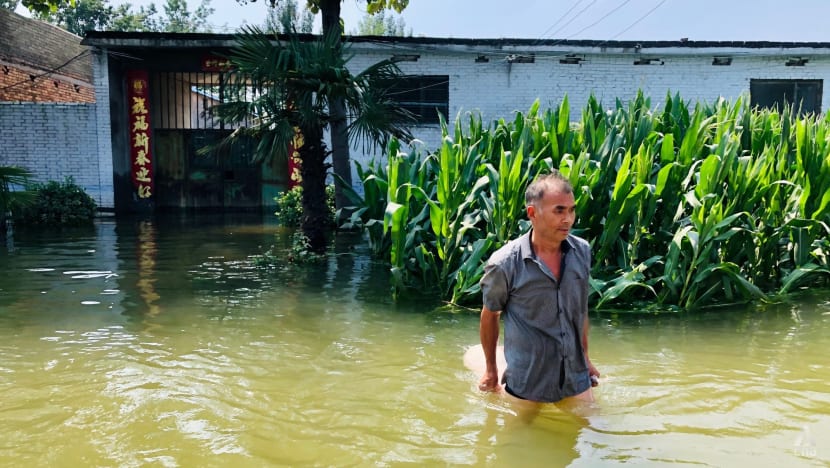 |
| Rescue teams try to reach flooded villages in Zhancheng, Henan province. (Photo: Olivia Siong) |
Olivia Siong
05 Aug 2021
ZHENGZHOU, Henan: For 11 hours, Zhu Gongjun perched precariously on a ladder in his home, watching floodwaters rise at an alarming rate.
Similar scenes played out across the city: Residents holding hands to cross streets covered in torrents of water, shop owners frantically moving goods to higher ground and people forced to stay the night at their workplace as the city's electricity and water supply came to a juddering halt.
And pure terror in Zhengzhou's subway system where more than a dozen people drowned in a flooded carriage.
CNA witnessed the aftermath of the deadly floods in July and spoke to survivors. These are their stories.
"THIS SEASON IS GONE"
It was not just Zhengzhou that felt the full force of the floods. Waterlogged fields were a common sight as CNA travelled around Henan province.
In some areas, crops were fully submerged, turning sprawling farmland into lakes, on which the carcasses of drowned livestock - pigs and sheep – floated.
Hou Xiurong has worked in the fields all her life. Her livelihood now hangs in the balance.
"Everything's been flooded, everything is gone. The water levels are up to (my neck) in the house," said the 45-year-old tearfully. "Everything I have is no more."
"We had to brave the rain at the time. Whatever (vegetables) we could move into the house, we did."
Henan is a major supplier of agricultural goods like corn, wheat and vegetables so the loss has also fuelled concerns about the impact on food supply in China.
In 2020, Henan produced more than a tenth of China's grain. At 68.3 million tonnes, it makes Henan China's second-largest producer. But authorities have tried to allay concerns. The Ministry of Agriculture and Rural Affairs said the impact on grain production and supply would be relatively limited.
Mr Liu, who grows long beans and peppers, said the flooding destroyed 80 per cent of his crops.
And while the skies have cleared, for now, he remained concerned about the prospect of more rain.
Mr Liu's family, like many others, rely solely on agriculture for their income. "Our feeling is that if it rains again, we may not be able to hold up."
FROM KINDERGARTEN TO RELIEF CENTRE
The rain that fell on Zhengzhou was so intense that the media used a Chinese saying in describing it as "once in a thousand years". Meteorologists would later confirm that the provincial capital experienced the equivalent of a year's rainfall in just three days.
Across Henan, close to 14 million people have been affected. One in 10 or 1.4 million have been relocated so far.
Among them is 50-year-old Li Xiuli and her 90-year-old mother-in-law, who were evacuated by a rescue team in Weihui county. It was a nerve-wracking ordeal as they made their way from their home to where a rescue boat could reach them.
"We were sitting on styrofoam pieces, floating on the water and a tall neighbour helped us," said Ms Li.
"There were volunteers who were counselling us saying, 'Everyone, don't be afraid, don't be afraid. We will definitely bring you out one by one, it's just a matter of time.'"
It would be two hours before rescuers got to them.
We spoke to Ms Li, who with her mother-in-law, were sent to a newly opened relocation centre in neighbouring Xinxiang city.
"Of course it feels good, the service is good and the volunteers have a great attitude," said Ms Li.
"When we arrived, they were helping the seniors and offering food and drink. We felt very comforted."
This relocation centre comes under the charge of 42-year-old kindergarten principal Du Guanli. The place had just started receiving evacuees when CNA arrived on Jul 26.
Earlier in the day, Ms Du had informed parents that the school would be reopening to students, after days of being shut due to the floods. Little did she expect that 10 minutes later, she would have to let those parents know that the school was being turned into a temporary shelter.
This was after she had received a phone call from a volunteer in flood-stricken Weihui county, asking for help to house those being displaced. Going through official channels, the volunteer said, would have been too slow.
Ms Du did not personally know the caller but she readily agreed.
"I think this is more important than reopening our kindergarten," said Ms Du, who has been in charge of the school for six years.
"The promise I've given to parents is that we can refund all the (school) fees and make up for lessons that have been missed. But right now, this is more important."
The school then sprang into action. Donations, including those from the students' parents, started streaming in as volunteers showed up, ready to help.
"Even though they may not have a home now, we hope that at our kindergarten they will feel like they are returning home. We will look after all of them," said Ms Du.
"THIS IS MY HOME, I AM NOT LEAVING"
And there are those who choose to stay behind. When CNA followed a rescue team on one of its boat operations in the town of Zhancheng, villagers were seen on the upper floors of their home or on rooftops in temporary shelters put together by parchment.
"I can't leave. This is my home, I am not leaving," said one elderly villager who was standing waist-deep in water.
"There are some villagers who don't have electricity and are without a telephone signal, and the people inside are unable to communicate with those outside," said Chen Qingqiang, one of the rescue team leaders, who had travelled from Jiangxi province to help with the relief work.
"We can only go back and forth, and patrol …There's water all around now so the electricity cannot be restored. It would be too dangerous."
For Ms Li, she is just grateful that, for now, she and her mother-in-law have a place to rest and eat. But she admitted the bigger challenge still lies ahead, when she finally returns home.
"There will definitely be losses, but it doesn't matter. As long as the house doesn't collapse, the rest doesn't matter," she said.
"At least we have our lives."
Source: CNA/ac
ZHENGZHOU, Henan: For 11 hours, Zhu Gongjun perched precariously on a ladder in his home, watching floodwaters rise at an alarming rate.
Similar scenes played out across the city: Residents holding hands to cross streets covered in torrents of water, shop owners frantically moving goods to higher ground and people forced to stay the night at their workplace as the city's electricity and water supply came to a juddering halt.
And pure terror in Zhengzhou's subway system where more than a dozen people drowned in a flooded carriage.
CNA witnessed the aftermath of the deadly floods in July and spoke to survivors. These are their stories.
"IF IT'S YOUR TIME TO GO, IT'S TIME TO GO"
Mr Zhu's mind drew a blank. Everything happened so quickly. It felt like just moments ago when rainwaters overflowed from the street outside and rushed into his home. Now he was covered in the brackish water all the way to his neck.
He had to find a way to stay alive.
"I quickly went to stand on the cupboard and when that was not high enough, I stood on the stereo," recalled Mr Zhu.
"But when that wasn't high enough again, I swam over to get a ladder and also retrieved a blanket to keep warm."
Mr Zhu said he tried calling for help, but signals were patchy. All this time, fatigue was setting in as he did his best to keep the ladder steady amid the swirling waters. He almost fell off a couple times and his feet stayed soaked all night.
"I couldn't think of anything ... things happened so quickly. It was too sudden."
But the father of three maintained he was not afraid.
"If it's your time to go, it's time to go. If you're meant to survive, you'll survive," he told CNA.
Mr Zhu's house, which also doubles up as a shop for his traditional tuina massage business, is located in the badly affected Erqi district in the centre of Zhengzhou.
When CNA visited Mr Zhu's home on Jul 24, the water had receded. Everything he owned – household appliances, books, furniture – was soaked and damaged. A brown sludge covered the floor.
Mr Zhu said it would take at least a week to tidy things up. "The items don't matter in the face of a natural disaster which man has no control over," he said. "The first step is to make sure you have your life."
Others in Mr Zhu's neighbourhood have also been left to pick up the pieces.
The heavy rainfall had turned the main street into an untamed river, overturning cars and licking dangerously at power lines above it.
Piles of debris that were swept up in the floodwaters now lined the streets. In the hot sun, the stench of rotting rubbish and stagnant water filled the air.
Mr Zhu's mind drew a blank. Everything happened so quickly. It felt like just moments ago when rainwaters overflowed from the street outside and rushed into his home. Now he was covered in the brackish water all the way to his neck.
He had to find a way to stay alive.
"I quickly went to stand on the cupboard and when that was not high enough, I stood on the stereo," recalled Mr Zhu.
"But when that wasn't high enough again, I swam over to get a ladder and also retrieved a blanket to keep warm."
Mr Zhu said he tried calling for help, but signals were patchy. All this time, fatigue was setting in as he did his best to keep the ladder steady amid the swirling waters. He almost fell off a couple times and his feet stayed soaked all night.
"I couldn't think of anything ... things happened so quickly. It was too sudden."
But the father of three maintained he was not afraid.
"If it's your time to go, it's time to go. If you're meant to survive, you'll survive," he told CNA.
Mr Zhu's house, which also doubles up as a shop for his traditional tuina massage business, is located in the badly affected Erqi district in the centre of Zhengzhou.
When CNA visited Mr Zhu's home on Jul 24, the water had receded. Everything he owned – household appliances, books, furniture – was soaked and damaged. A brown sludge covered the floor.
Mr Zhu said it would take at least a week to tidy things up. "The items don't matter in the face of a natural disaster which man has no control over," he said. "The first step is to make sure you have your life."
Others in Mr Zhu's neighbourhood have also been left to pick up the pieces.
The heavy rainfall had turned the main street into an untamed river, overturning cars and licking dangerously at power lines above it.
Piles of debris that were swept up in the floodwaters now lined the streets. In the hot sun, the stench of rotting rubbish and stagnant water filled the air.
 |
| Mr Zhu’s neighbourhood that is still lined with debris, overturned cars and trash. (Photo: Olivia Siong) |
"We are most worried that if there is another round of rain and if this rubbish isn't cleared, it will result in clogging and we will be submerged in it," said a female resident who only wanted to be known as Ms Dong.
"We are also worried about our health."
"We are also worried about our health."
"NO ONE EXPECTED THAT IT WOULD BECOME A DISASTER"
Despite the harrowing experience and the huge losses, Mr Zhu and many others we spoke to in Zhengzhou said they considered themselves lucky.
More than 300 people across Henan province are known to have died. Zhengzhou bore the brunt of it with 292 fatalities. Of those, 14 drowned in a subway car on Jul 21.
Videos and photos of commuters trapped for hours in steadily rising waters, as well as what many believed were their last conversations with loved ones, circulated on Chinese social media.
The city's subway network remained closed in the week that followed.
But the area outside Shakoulu subway station, where the deaths occurred, has been turned into an unofficial tribute site.
A barricade had originally been set up at the station blocking off the area - sparking anger and criticism from locals and on social media. A subsequent post showing people removing the yellow barriers was widely praised.
Despite the harrowing experience and the huge losses, Mr Zhu and many others we spoke to in Zhengzhou said they considered themselves lucky.
More than 300 people across Henan province are known to have died. Zhengzhou bore the brunt of it with 292 fatalities. Of those, 14 drowned in a subway car on Jul 21.
Videos and photos of commuters trapped for hours in steadily rising waters, as well as what many believed were their last conversations with loved ones, circulated on Chinese social media.
The city's subway network remained closed in the week that followed.
But the area outside Shakoulu subway station, where the deaths occurred, has been turned into an unofficial tribute site.
A barricade had originally been set up at the station blocking off the area - sparking anger and criticism from locals and on social media. A subsequent post showing people removing the yellow barriers was widely praised.
 |
| Flowers line the entrance of Shakoulu subway station in Zhengzhou. (Photo: Olivia Siong) |
"No one expected that this would become a disaster. I, like others, thought that it was just heavy rain and that it would be all right when the rain stopped," said a 30-year-old lady who requested to be identified as Ms Zhang.
She was among a steady stream of Zhengzhou residents – young and old – who came to leave flowers, say prayers and pay their respects to the subway victims.
"We didn't expect it to turn out this way," Ms Zhang added.
Railway authorities have been accused of a poor response and dereliction of duty. Others questioned why the subway was even allowed to operate despite the risk of flooding. Authorities said that extreme rainfall caused severe water logging in parts of the subway line, causing the retaining walls that protected it to crumble.
She was among a steady stream of Zhengzhou residents – young and old – who came to leave flowers, say prayers and pay their respects to the subway victims.
"We didn't expect it to turn out this way," Ms Zhang added.
Railway authorities have been accused of a poor response and dereliction of duty. Others questioned why the subway was even allowed to operate despite the risk of flooding. Authorities said that extreme rainfall caused severe water logging in parts of the subway line, causing the retaining walls that protected it to crumble.
"THIS SEASON IS GONE"
It was not just Zhengzhou that felt the full force of the floods. Waterlogged fields were a common sight as CNA travelled around Henan province.
In some areas, crops were fully submerged, turning sprawling farmland into lakes, on which the carcasses of drowned livestock - pigs and sheep – floated.
Hou Xiurong has worked in the fields all her life. Her livelihood now hangs in the balance.
"Everything's been flooded, everything is gone. The water levels are up to (my neck) in the house," said the 45-year-old tearfully. "Everything I have is no more."
 |
| Hou Xiurong says she’s lost everything because of the floods. Her village is in the badly affected county of Weihui. (Photo: Olivia Siong) |
Ms Hou lives in a village in Weihui, a county around 100 kilometres north of Zhengzhou. It is one of the most badly affected areas in the region.
She estimated she would lose about US$4,600 in income this season, as the corn she was growing had been completely wiped out.
"We can't grow anything anymore this season even if we wanted to," said Ms Hou. "The water is still flowing in and can't be drained. This season is gone."
Many farmers have taken things into their own hands. Some were seen pumping water out from their farmland, hoping to salvage what they could.
Liu Kaidong, 52, set up shop by a main road in Xinxiang city, now a temporary site for vegetable farmers as the wholesale market remains flooded and closed. "There was no hope. We didn't consider too much. As long as the people were safe, the land didn't matter," said Mr Liu.
She estimated she would lose about US$4,600 in income this season, as the corn she was growing had been completely wiped out.
"We can't grow anything anymore this season even if we wanted to," said Ms Hou. "The water is still flowing in and can't be drained. This season is gone."
Many farmers have taken things into their own hands. Some were seen pumping water out from their farmland, hoping to salvage what they could.
Liu Kaidong, 52, set up shop by a main road in Xinxiang city, now a temporary site for vegetable farmers as the wholesale market remains flooded and closed. "There was no hope. We didn't consider too much. As long as the people were safe, the land didn't matter," said Mr Liu.
"We had to brave the rain at the time. Whatever (vegetables) we could move into the house, we did."
Henan is a major supplier of agricultural goods like corn, wheat and vegetables so the loss has also fuelled concerns about the impact on food supply in China.
In 2020, Henan produced more than a tenth of China's grain. At 68.3 million tonnes, it makes Henan China's second-largest producer. But authorities have tried to allay concerns. The Ministry of Agriculture and Rural Affairs said the impact on grain production and supply would be relatively limited.
Mr Liu, who grows long beans and peppers, said the flooding destroyed 80 per cent of his crops.
And while the skies have cleared, for now, he remained concerned about the prospect of more rain.
Mr Liu's family, like many others, rely solely on agriculture for their income. "Our feeling is that if it rains again, we may not be able to hold up."
FROM KINDERGARTEN TO RELIEF CENTRE
The rain that fell on Zhengzhou was so intense that the media used a Chinese saying in describing it as "once in a thousand years". Meteorologists would later confirm that the provincial capital experienced the equivalent of a year's rainfall in just three days.
Across Henan, close to 14 million people have been affected. One in 10 or 1.4 million have been relocated so far.
Among them is 50-year-old Li Xiuli and her 90-year-old mother-in-law, who were evacuated by a rescue team in Weihui county. It was a nerve-wracking ordeal as they made their way from their home to where a rescue boat could reach them.
"We were sitting on styrofoam pieces, floating on the water and a tall neighbour helped us," said Ms Li.
"There were volunteers who were counselling us saying, 'Everyone, don't be afraid, don't be afraid. We will definitely bring you out one by one, it's just a matter of time.'"
It would be two hours before rescuers got to them.
We spoke to Ms Li, who with her mother-in-law, were sent to a newly opened relocation centre in neighbouring Xinxiang city.
"Of course it feels good, the service is good and the volunteers have a great attitude," said Ms Li.
"When we arrived, they were helping the seniors and offering food and drink. We felt very comforted."
This relocation centre comes under the charge of 42-year-old kindergarten principal Du Guanli. The place had just started receiving evacuees when CNA arrived on Jul 26.
Earlier in the day, Ms Du had informed parents that the school would be reopening to students, after days of being shut due to the floods. Little did she expect that 10 minutes later, she would have to let those parents know that the school was being turned into a temporary shelter.
This was after she had received a phone call from a volunteer in flood-stricken Weihui county, asking for help to house those being displaced. Going through official channels, the volunteer said, would have been too slow.
Ms Du did not personally know the caller but she readily agreed.
"I think this is more important than reopening our kindergarten," said Ms Du, who has been in charge of the school for six years.
"The promise I've given to parents is that we can refund all the (school) fees and make up for lessons that have been missed. But right now, this is more important."
The school then sprang into action. Donations, including those from the students' parents, started streaming in as volunteers showed up, ready to help.
"Even though they may not have a home now, we hope that at our kindergarten they will feel like they are returning home. We will look after all of them," said Ms Du.
"THIS IS MY HOME, I AM NOT LEAVING"
And there are those who choose to stay behind. When CNA followed a rescue team on one of its boat operations in the town of Zhancheng, villagers were seen on the upper floors of their home or on rooftops in temporary shelters put together by parchment.
 |
| A resident of a flooded village in Zhancheng, Henan province. (Photo: Olivia Siong) |
"There are some villagers who don't have electricity and are without a telephone signal, and the people inside are unable to communicate with those outside," said Chen Qingqiang, one of the rescue team leaders, who had travelled from Jiangxi province to help with the relief work.
"We can only go back and forth, and patrol …There's water all around now so the electricity cannot be restored. It would be too dangerous."
For Ms Li, she is just grateful that, for now, she and her mother-in-law have a place to rest and eat. But she admitted the bigger challenge still lies ahead, when she finally returns home.
"There will definitely be losses, but it doesn't matter. As long as the house doesn't collapse, the rest doesn't matter," she said.
"At least we have our lives."
Source: CNA/ac
No comments:
Post a Comment